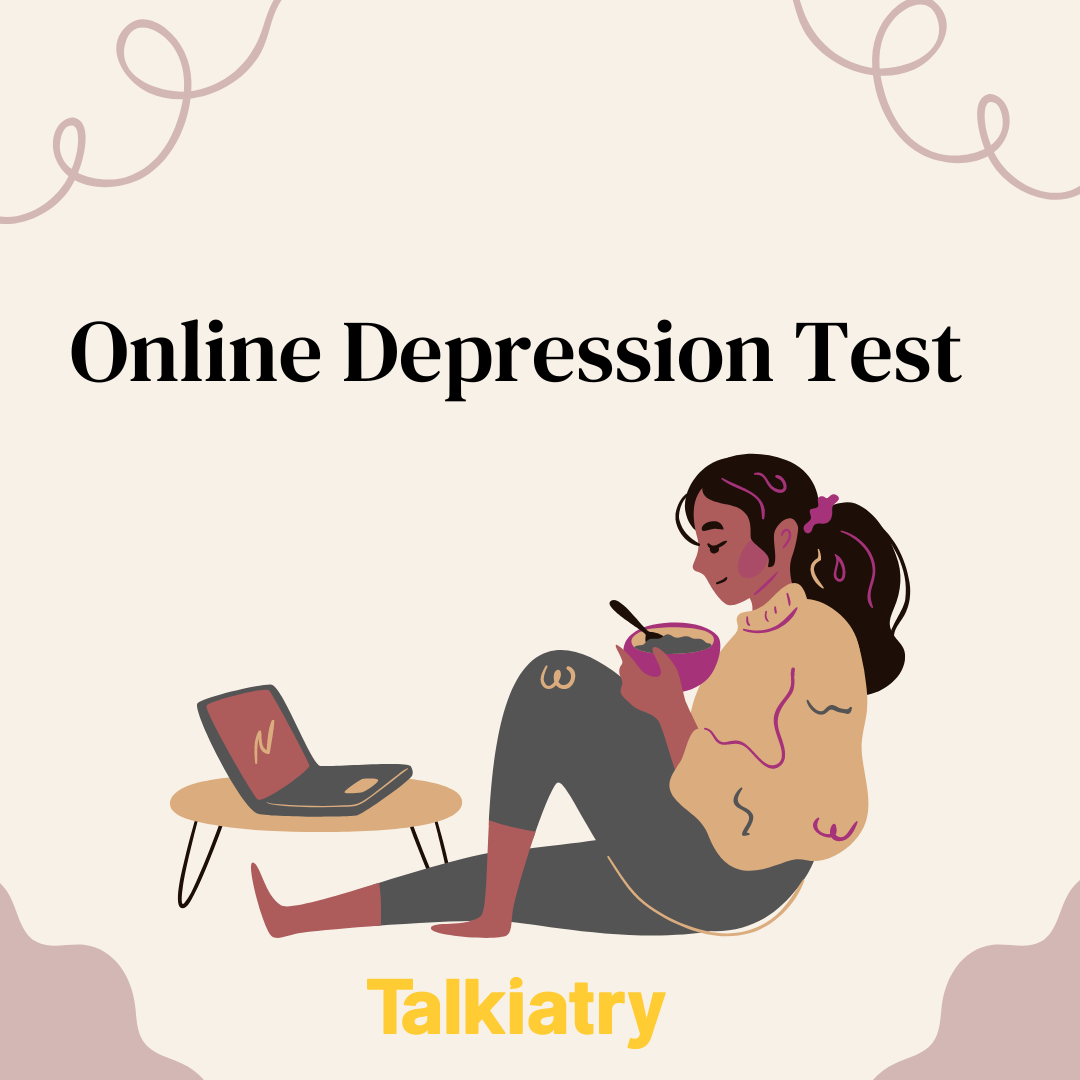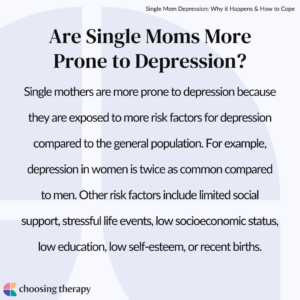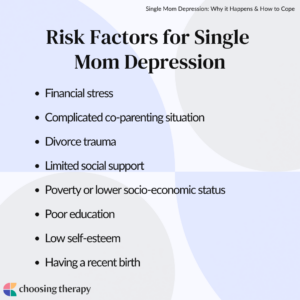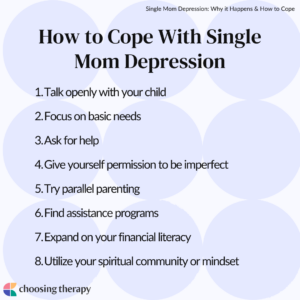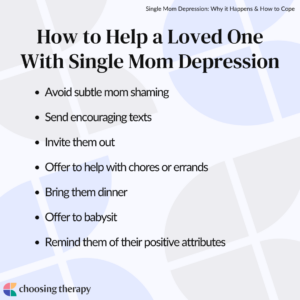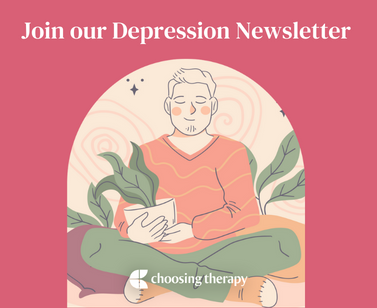Single mom depression occurs when social, personal, and financial stressors of being a single parent compound into symptoms of depression.1,2 As a single depressed mother, you can cope by asking for help from community resources, building solid relationships with friends and family, seeking your own therapy, and stabilizing parent-child relationships.
Depression Is Treatable With Therapy Would you like to feel more happiness and joy? BetterHelp has over 20,000 licensed therapists who provide convenient and affordable online therapy. BetterHelp starts at $65 per week. Take a Free Online Assessment and get matched with the right therapist for you.
How Does Being a Single Mother Affect Your Mental Health?
Single mothers often experience a lack of social systems and financial stability needed to support mental well-being.1 Trying to make ends meet while facing the endless demands of parenthood can lead to chronic stress and mom burnout. This can result in feeling disconnected from their children, losing confidence in parenting abilities, or experiencing rage or sadness.
Single mothers often have money anxiety due to extra burdens like purchasing childcare for working hours or having to reduce working hours to be with children. Additionally, single mothers may have limited access to and use of healthcare resources.2 Single mothers may also not have good insurance, which impacts their ability to access and utilize appropriate mental healthcare resources, like beginning therapy or seeing a psychiatrist.
Are Single Moms More Prone to Depression?
Single mothers are more prone to depression because they are exposed to more risk factors for depression compared to the general population.2 For example, depression in women is twice as common compared to men.3 Other risk factors include limited social support, stressful life events, low socioeconomic status, low education, low self-esteem, or recent births, leading to postpartum depression for many mothers.2
Divorce may not only lead to depression but also feelings of low self-esteem and competence.4 Divorce can compound feelings of depression when it limits access to previous financial or social resources, such as reduced income or lack of support from previous friends or family.
Do All Women Experience Depression After Divorce?
It is important to note that not all women will experience depression as a result of divorce and single motherhood, and researchers are also looking into positive mental health outcomes for divorce. Even though single mothers face hardships, some women grow in their assertiveness and autonomy, and bloom in the independence of single motherhood while still helping their children maintain relationships with the other parent if appropriate.
Signs & Symptoms of Single Mom Depression
Signs of depression in single mothers may mimic symptoms of depression in the general population. Due to societal standards placed on solo parents, some symptoms of single mom depression may be more visible than others. For example, a depressed single mom might feel too embarrassed to invite friends over because she hasn’t had the energy to clean the house in weeks.
Common signs and symptoms of single mom depression are:
- Excessive mom guilt about the quality of parenting
- Rumination over life choices leading to single motherhood
- Inability to complete routine household chores
- Feelings of anger toward the co-parent
- Crying spells once children are asleep or behind closed doors
- Feeling too exhausted to ask for help
- Feeling disconnected from children
- Feelings that the children might be better off with the other parent
Impact of Single Mom Depression on the Kids
Single-mom depression affects not just the mother but also her children. Children of depressed parents experience higher rates of mental health and behavioral issues than non-depressed parents.5 Children may begin to have emotional and social problems with their peers or other family members as a reaction to their mother’s depression.
The quality of the mother-child relationship may also suffer. Younger children may avoid being around their mother if she shows signs of depression or may become confused or fearful of their mother. Teenage children also might experience parentification as a result of filling in uncompleted household tasks or caring for their mother’s emotional needs.
Risk Factors for Single Mom Depression
Risk factors for developing single-mom depression include social, financial, health, housing, and chronic stressors.1 Although not all women who experience these stressors will go on to develop depression, these risk factors increase the chances for symptoms to develop or worsen.
Risk factors for single mom depression include:
Financial Stress
One study found that being a woman, having children, and single parenting were associated with the highest rates of income inadequacy for one state-wide population of women.6 Financial stress negatively impacts a single mother’s ability to provide for herself and her children.
A lack of access to decent-paying jobs, daycare costs, the cost of separation or divorce, and the cost of basic supplies like groceries and hygiene products, added to the growing prices of housing and healthcare, all factor into single mothers’ financial burdens.
Complicated Co-Parenting Situation
Another stressful life event that may exacerbate single mom depression includes co-parenting with a toxic ex. A depressed single mom may already have lower self-esteem and feel incompetent as a parent. A toxic ex may worsen this symptom of single-mom depression by using means of power and control to add to her depression.
Some complications from the ex may include making negative comments about parenting, refusing to let the mom spend time with her kids, or using other means of power and control, like using their financial advantages, to convince children to spend more time with the other parent.
Divorce Trauma
Some single moms may develop post-divorce PTSD or divorce trauma after their separation. Although divorce trauma is not a diagnosable condition, single moms may develop PTSD symptoms from particularly traumatic divorces, such as those with abusive partners. A depressed single mom who is already experiencing depression symptoms and then has the additional stress of court proceedings and child custody evaluations may be at increased risk.
Limited Social Support
Women who lack a social support system may be more likely to develop symptoms of depression. Especially in communities where resources are already lacking, having social support can buffer some of the symptoms experienced by more isolated single mothers. For example, a depressed single mom who is running low on groceries for the week might be able to ask a family member if they can come over with the kids for dinner. Therefore, if a single mom does not have social support, she is more likely to struggle with depression.
Poverty or Lower Socio-Economic Status
Poverty and lower socio-economic status affect a single mom’s access to basic needs, such as food, shelter, and healthcare. In 2021, single mothers showed almost double the rates of living in poverty than single fathers, with a rate of 31.3% versus 15.5%.7 A depressed single mom who is from poverty or enters poverty through divorce is at a higher risk of developing depression than those who are above the poverty line.
Poor Education
Women with poorer educations may be at increased risk for experiencing single-mom depression.2 Lack of education can impact knowledge of resources, access to resources, and access to better-paying jobs, which are important survival pieces of a single-income household. Having a poor education can even extend to a single mom’s understanding of what it means to have depression and, therefore, knowing that they need to see a therapist.
Low Self-Esteem
Low self-esteem is a predictor of depression in the general population, and single mothers commonly experience low feelings of self-worth.2 Experiencing low self-esteem can make existing feelings of pessimism and hopelessness worse. A single, depressed mom with low self-esteem may not believe she has the personal skills to overcome her situation, and this may worsen her experience of depression.
Having a Recent Birth
Around one in eight women will experience postpartum depression after a recent birth.8 Being a single mother who has recently given birth increases risk factors for experiencing depression. Other factors related to recently giving birth, which increase the risk of single mom depression, include being a mom to multiple children, being a teen mom, giving birth pre-term, or pregnancy and birth trauma.9
Help For Depression BetterHelp – Get help from a licensed therapist. BetterHelp offers convenient and affordable online therapy starting at $65 per week. Free Assessment Talkspace – Online Therapy With Or Without Insurance. Talkspace accepts many insurance plans including Optum, Cigna, and Aetna. Typical co-pay is $30, but often less. Get started
How to Cope With Single Mom Depression
Coping with single-mom depression can seem like a huge task when you are already feeling burned out by your day-to-day responsibilities. Although every single depressed mom may have a unique recovery path, these are some general strategies some might find helpful to try to cope with single-mom depression.
Here are eight ways to cope with single-mom depression:
1. Talk Openly With Your Child
Speaking honestly about your mental health and setting clear boundaries with your children can help build trust and promote a strong mom-child relationship. Age, maturity level, and boundaries with other involved co-parents may be factors to take into account when talking to your child about depression. For example, if you have a strong relationship with a co-parent, involving them in family conversations around depression may help your child feel their parents are unified.
Depending on the age of your child, you may decide certain symptoms are appropriate to discuss and others are not. For example, you may decide to avoid telling them about experiencing feelings of disconnected from them but feel it is appropriate to discuss that you sometimes feel sad and need time alone to journal about your depression.
Here are a few examples of how you can talk to your child about your depression:
- Involve the other co-parent if they are willing and able
- Use relevant age-appropriate books about depression to support your talk
- Remind your child about their own support system and people they can confide in when they aren’t comfortable speaking directly with you
- If your child has a therapist or counselor, ask them to support you in your conversation
- If you have a young child or an adolescent, utilizing a feelings wheel can help them identify and discuss feelings related to the conversation
2. Focus on Basic Needs
The P.L.E.A.S.E skill from DBT is a simple acronym to help you remember the basics around mental and physical well-being. The skill is easy to remember and can function as a check-in for how you are coping with single-mom depression.
Here are some ways to practice P.L.E.A.S.E.:
- Treat physical illness: Remember to schedule and keep up with physical health appointments, especially primary care yearly exams. Attending these appointments is a proactive way to prevent any health issues from worsening.
- Balanced eating: Focusing on what foods feel good in your body can help you begin to facilitate a mind-body connection. If you aren’t sure where to begin, consulting a registered dietician can help you understand some of the basics of creating a healthy meal plan for your depression.
- Avoid mood-altering drugs: A good rule of thumb around substances is to remember that they generally do the opposite coming out of your system as they did going on. So, if a sugary coffee pumps you up and makes you productive, it might cause a crash later on in the afternoon.
- Balanced sleep: A lack of sleep can worsen depression. Therefore, proper sleep hygiene is often an overlooked piece of well-being. Experiment with different sleep routines to figure out what works best to calm your body and mind before bed.
- Exercise regularly: Exercise can combat depression when used as a regular and routine coping mechanism. Figuring out what types of movement your body enjoys is a good way to start a routine you will actually want to keep up with.
3. Ask for Help
Seeking support is an important piece of recovery from single-mom depression. Feelings of isolation are a common experience during depression, and sometimes, it can feel like reaching out for help is the last thing you have energy for. By pushing yourself to seek help from others, you can begin to develop close and trusting relationships and model good communication skills for your child.
Remember that you can ask for help with your depression in different ways. Single-mom depression can impact multiple factors of your life, and you may need help in some areas but not others. For example, maybe it could be beneficial for your friend to drop off some groceries to save you some time, but you are able to pay them back financially for their help.
Here are a few examples of how you can ask for help:
- If a lack of sleep is fueling your depression, ask a loved one to pick up the kids from school so you can take a quick nap.
- If economic factors are fueling your depression, find local resources like food banks or women’s shelters that may be willing to help with rent, food, or hygiene supplies.
- If a lack of purpose is complicating depression, seeking guidance or mentorship from your spiritual community can provide existential support.
- If you are finding yourself in need of more time, asking a family member or friend to run errands can help you prioritize some of your to-dos.
- If anxiety or depression symptoms are worsening, finding a therapist may provide mental health support.
- If co-parenting or divorce-related issues are contributing to depression, a divorce mediator or seeking counsel around having a collaborative divorce could help you draw boundaries for a more stable future.
4. Give Yourself Permission to Be Imperfect
Remember that no parent is perfect, and there is no one-size-fits-all handbook on parenting. Give yourself permission to be a good mom, not a perfect mom. This might look like dwindling down your list of to-dos to a minimum on the days when you feel like you are lacking energy or focus.
By reminding yourself that it’s okay not to be perfect, you can reduce your chances of experiencing the pains of mom guilt. Moms have enough societal pressure as it is without the experience of single-mom depression. If you are a depressed single mom, remember that it’s okay to do the minimum some days.
5. Try Parallel Parenting
Some single mothers find parallel parenting to be a helpful strategy for maintaining boundaries in the co-parenting dynamic. Parallel parenting encourages separated couples to parent their children independently from one another on most issues. Especially if your relationship was physically or emotionally abusive, parallel parenting allows you to keep power and control within your household in a healthy way.
6. Find Assistance Programs
Single moms are more likely to struggle with financial stress than their married counterparts. Assistance programs can help with aspects like rent, groceries, hygiene products, daycare, and other expenses. Assistance programs can be found through schools, employers, places of worship, community centers, domestic violence shelters, or the government.
7. Expand on Your Financial Literacy
Because financial stress can be common among single mothers, expanding financial literacy can help make the most of what you have. Operating on a single-parent income means that organizing and prioritizing expenses may be necessary to adapt to the cost of living. Different aspects of financial literacy include learning how to budget, developing a savings plan, or having a strategy to pay down debt or build credit.
8. Utilize Your Spiritual Community or Mindset
Spirituality is a sense of connecting to a purpose greater than oneself. For some people, spirituality is centered around organized religion or religious figures. For other people, spirituality is focused on developing a sense of meaning and connection within themselves and others. Spiritual activities might include prayer or meditation for depression. Even spending ten minutes in nature can be beneficial for your mental health.
Single-mom depression can cause feelings of hopelessness or purposelessness. Through connecting to a spiritual community or fostering your own principles, you can combat feelings of existential loneliness and build a sense of connection with the world.
Depression Is Treatable With Therapy Would you like to feel more happiness and joy? BetterHelp has over 20,000 licensed therapists who provide convenient and affordable online therapy. BetterHelp starts at $65 per week. Take a Free Online Assessment and get matched with the right therapist for you.
How to Help a Loved One With Single Mom Depression
Supporting a loved one through single mom depression includes asking your loved one about their needs and trying strategies they may not have suggested. Chances are that your loved one is fatigued, and one more decision, like asking for help, may feel like too much. Offering to help a stressed mom in specific ways may also help them avoid the energy or shame of having to ask.
Here are some ways to help a loved one with single mom depression:
Avoid Subtle Mom Shaming
While overt mom shaming may be obvious to avoid, there are more subtle tactics of mom-shaming that even loved ones can unconsciously promote. Mom shaming, although it can come from a place of concern for a loved one, involves any critiquing or judgment around parenting ability or capacity.
One example of mom shaming might include negative comments about electronics usage. Some single moms might use electronics to help entertain children while they finish a task since they don’t have another parent in the household to help. Even a well-meaning loved one could comment on this usage in a negative way when it may be a single mom’s only way to easily entertain her kids while she fixes dinner.
Send Encouraging Texts
Sending an encouraging text lets your loved one know they are on your mind. Depression can include feelings of loneliness and isolation. Your loved one may not know how to seek social support or may feel too exhausted to reach out. Sending them a simple encouraging text is an easy and low-pressure way of communicating your care.
Here are examples of encouraging texts you can send someone going through single-mom depression:
- “Sending you a hand squeeze today.”
- “Just wanted you to know I am thinking of you and the kids today.”
- “Always know I’m just one phone call away!”
- “I was thinking maybe I could bring you and the kids some take-out tonight.”
- “Do you want me to drop by this weekend to help you cook and clean?”
Invite Them Out
Single-mom depression can shrink a person’s social circle. Not only might they feel too exhausted to reach out, but some friends may not know how to deal with single-mom depression. Inviting your loved one to events will let them know you miss their presence. Even if they don’t come, sometimes continuing to extend the invitation is a way you can ensure they know you want them around.
Offer to Help With Chores or Errands
Single moms often have lengthy to-do lists that can feel twice as long when experiencing single-mom depression. Offering to help with household chores or errands is an actionable item to help decrease the stress on your loved one. If your friend won’t accept you doing chores or errands for them, offer to ride along and keep them company.
Bring Them Dinner
Sometimes, even the simple to-dos are too much when experiencing single-mom depression. Dropping by with dinner, whether home-cooked or take-out, is an easy expression of support to give your loved one. By not having to spend the mental or physical energy planning or cooking dinner, you will give your friend the gift of time back!
Offer to Babysit
Single moms sometimes just need a break from their little ones. Especially when experiencing single-mom depression, feelings of disconnection and exhaustion around parenting are common. Offering to babysit the kids for a few hours could give your loved one a chance to catch up on sleep or maybe go on a well-deserved date.
Remind Them of Their Positive Attributes
Single mothers sometimes struggle with feelings of low self-esteem. Single-mom depression can compound feelings of helplessness or worthlessness. Reminding your friend of her positive attributes can help her feel validated and confident. You can do this through a simple text, writing a card, or even leaving a positive voicemail.
When to Seek Professional Support for Depression
Symptoms of single-mom depression can compound and worsen over time if not treated. If your capacity to cope feels overwhelming, and especially if you are beginning to experience any feelings of suicidal ideation, it is time to seek professional help. An online therapist directory or online therapy platform may be a good choice for finding a therapist who specializes in depression.
Treatment options for depression include:
- Dialectic behavioral therapy (DBT): DBT for depression helps develop skills like mindfulness, interpersonal effectiveness, emotion regulation, and distress tolerance. Through developing these skills, coping with depression can seem more manageable.
- Medications: Medications for depression could include antidepressants, which work to increase certain levels of brain chemicals for more adaptive functioning. It can sometimes take a few weeks to feel the effects of antidepressants, which is why early intervention is important.
- Cognitive behavioral therapy (CBT): CBT for depression can help single moms understand the interaction between thoughts, emotions, and behaviors around their depression. Learning to challenge the cognitive distortions and emotions of depression can help develop more adaptive behaviors for coping.
- Acceptance and commitment therapy (ACT): ACT for depression can help a single mom utilize mindfulness and behavioral therapy principles to accept and tolerate feelings of depression. Through ACT, single moms can learn to lead more purposeful and meaningful lives driven by their core values.
- Mindfulness-based cognitive therapy (MBCT): MBCT is based on principles of CBT and helps a single mom to utilize mindfulness and meditation to cope with feelings of depression. It has specifically been found to help with treatment-resistant depression.
- Solution-focused therapy (SFT): SFT is a brief therapy designed to focus on the strengths of the single mother and built on actionable, concrete steps toward change. SFT for depression might help a single mom to reframe and refocus on positive behavioral changes rather than emphasizing problems.
In My Experience
To help our readers take the next step in their mental health journey, Choosing Therapy has partnered with leaders in mental health and wellness. Choosing Therapy is compensated for marketing by the companies included below. Talk Therapy Online-Therapy.com – Get support and guidance from a licensed therapist. Online-Therapy.com provides 45 minute weekly video sessions and unlimited text messaging with your therapist for only $64/week. Get Started Online Psychiatry Hims / Hers If you’re living with anxiety or depression, finding the right medication match may make all the difference. Connect with a licensed healthcare provider in just 12 – 48 hours. Explore FDA-approved treatment options and get free shipping, if prescribed. No insurance required. Get Started Depression Newsletter A free newsletter from Choosing Therapy for those impacted by depression. Get helpful tips and the latest information. Sign Up Learn Anti-Stress & Relaxation Techniques Mindfulness.com – Change your life by practicing mindfulness. In a few minutes a day, you can start developing mindfulness and meditation skills. Free Trial Choosing Therapy Directory You can search for therapists by specialty, experience, insurance, or price, and location. Find a therapist today.Additional Resources
Online Depression Test A few questions from Talkiatry can help you understand your symptoms and give you a recommendation for what to do next. Best Online Psychiatry Services Online psychiatry, sometimes called telepsychiatry, platforms offer medication management by phone, video, or secure messaging for a variety of mental health conditions. In some cases, online psychiatry may be more affordable than seeing an in-person provider. Mental health treatment has expanded to include many online psychiatry and therapy services. With so many choices, it can feel overwhelming to find the one that is right for you.